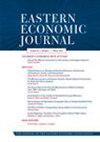国家秘密监视能力
IF 0.5
Q3 ECONOMICS
引用次数: 0
摘要
国家能力-公民社会权衡模型倾向于将 "国家 "和 "公民社会 "视为相互制约的独立实体。然而,这种建模技术将各自视为相对黑箱,从而忽略了集体环境中个人行动的细微差别。本文以 20 世纪和 21 世纪出现的监控国家为背景,探讨了这种平衡。随着国家监控能力的增强,国家能够更好地应对来自公民的威胁。然而,监控能力的增强也削弱了社会压力遏制专制进步的能力,即使在公民社会蓬勃发展的国家也是如此。本文章由计算机程序翻译,如有差异,请以英文原文为准。
State Capacity of Secret Surveillance
The state capacity-civil society tradeoff model tends to treat the “state” and “civil society” as separate entities who move to constrain one another. However, this modeling technique leaves out the nuances of individual action within a collective setting by treating each as a relative black box. This article explores this balance in the context of the surveillance state that has arisen in the 20th and 21st century. As state capacity in surveillance increases it better allows the state to respond to threats to citizens from citizens. However, the increased capacity also lessens the ability of societal pressure to check authoritarian advances even in a nation with a thriving civil society presence.
求助全文
通过发布文献求助,成功后即可免费获取论文全文。
去求助
来源期刊

Eastern Economic Journal
ECONOMICS-
CiteScore
2.10
自引率
0.00%
发文量
27
期刊介绍:
The Eastern Economic Journal, a quarterly publication of the Eastern Economic Association, was established in 1973. The EEJ publishes papers written from every perspective, in all areas of economics and is committed to free and open intellectual inquiry from diverse philosophical perspectives. It welcomes manuscripts that are methodological and philosophical as well as empirical and theoretical. Readability and general interest are major factors in publication decision.
 求助内容:
求助内容: 应助结果提醒方式:
应助结果提醒方式:


